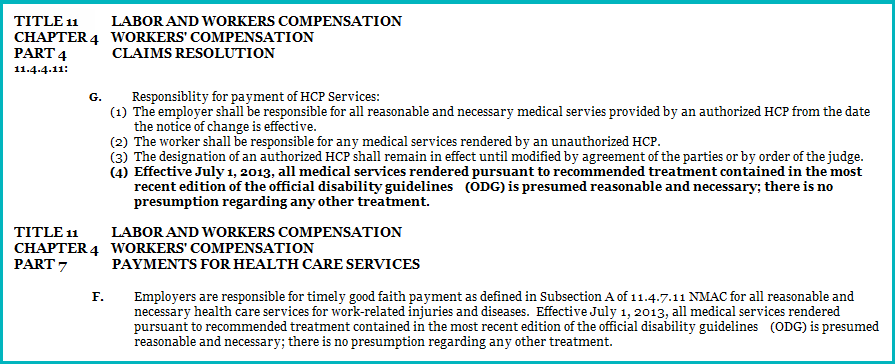On July 1, 2013, the Official Disability Guidelines (ODG); went into effect in New Mexico under Parts 4 and 7 of the WCA Rules for the treatment of workers’ compensation injuries. All medical services rendered for recommended treatment contained in the most recent edition of Official Disability Guidelines (ODG) are presumed reasonable and necessary. The ODG is now managed by MCG.

ODG FAQs (Click on the question below to expand the section to view the answer)
A1: ODG provides evidence-based medical treatment and return-to-work guidelines along with analytical tools specifically designed to improve and benchmark return-to-work performance, facilitate quality care while limiting inappropriate utilization, assess claim risk for interventional triage, and set reserves based on industry data. Evidence-based guidelines from ODG span the continuum of workers' comp, occupational health, and group life/disability cases, supporting clinical decisions, RTW and care planning, and facilitating better communications between providers and payers.
A2: Chapters, which are based on body parts such as "The Knee and Leg" or general conditions such as "Pain," begin with a summary of the most common diagnosis and complaints followed by recommended treatments. Information about recommended time out of work is also included in this section, where applicable The most important part of each chapter is in the "Procedure Summary" section which contains a comprehensive list of treatments that could be performed for injuries to specific body parts or on general conditions as indicated by the chapter name. Each possible treatment procedure is listed as recommended, not recommended, or under study and all recommendations are based on an comprehensive and ongoing review of peer-reviewed scientific studies.
Also, part of the Treatment Guidelines is the UR Advisor and the Drug Formulary/NDC Advisor. The UR Advisor allows users to plug in the diagnosis and a procedure (by code or key words) to get the ODG Approval Status, along with other data like median number of visits or average costs. The Drug Formulary is where all of the medications found in ODG are indexed, and the NDC Advisor is a look-up tool for easy access to specific drugs by name or NDC. Information provided includes strength, trade name, ODG status (Y or N), as well as links to the Procedure Summaries where more information is available on adverse effects, dosage, and links to the medical evidence.
Also, part of the Treatment Guidelines is the UR Advisor and the Drug Formulary/NDC Advisor. The UR Advisor allows users to plug in the diagnosis and a procedure (by code or key words) to get the ODG Approval Status, along with other data like median number of visits or average costs. The Drug Formulary is where all of the medications found in ODG are indexed, and the NDC Advisor is a look-up tool for easy access to specific drugs by name or NDC. Information provided includes strength, trade name, ODG status (Y or N), as well as links to the Procedure Summaries where more information is available on adverse effects, dosage, and links to the medical evidence.
A3: MCG Health publishes ODG. The ODG applies evidence-based medicine to improve outcomes. Visit MCG Health to learn more.
A4: Contact MCG for more information.
A5: Yes. The free self-paced Web-based demo is on demand. Access the ODG workers' compensation guidelines. Visit the MCG resources page for further training at no cost..
A6: Contact Suzanne Swirsky at Suzanne.Swirsky@mcg.com of MCG Health.
A7: The following section pertains to the FAQs from the workshop.
Who develops and writes the guidelines?
There is an Editorial Advisory Board whose members are health care professionals that develop, review and approve changes to the guidelines. There are about 100 members, most of whom are volunteers and some who are editorial writers who are compensated.
There is an Editorial Advisory Board whose members are health care professionals that develop, review and approve changes to the guidelines. There are about 100 members, most of whom are volunteers and some who are editorial writers who are compensated.
Are Doctors restricted to the guidelines?
Doctors are not bound to the guidelines. The guidelines create a presumption that treatments are reasonable and necessary. WCA rules say that treatment that is reasonable and necessary should be paid. That doesn’t mean the treatment is automatically approved.
Doctors are not bound to the guidelines. The guidelines create a presumption that treatments are reasonable and necessary. WCA rules say that treatment that is reasonable and necessary should be paid. That doesn’t mean the treatment is automatically approved.
What if the HCP decides the best reasonable and necessary treatment is outside of the ODG? If it is determined by the health care provider that treatment for an injured worker outside of the ODG is necessary they can document the clinical reasons for these exceptions. ODG includes an Appendix D, "Documenting Exceptions to the Guidelines" that can assist in providing language and supporting documents to help in these cases. Eventually it is hoped that the use of ODG will simplify the authorization process but it is not intended to be an “end all” process.
Why do attorneys need access? In a disputed claim an attorney will want to be able to ensure their clients are receiving reasonable care. In the case of conflicting opinions it could assist attorneys as another resource on medical issues.
If an injured workers treatment is recommended under ODG is there an automatic approval? The presumption is that it is reasonable and necessary. Thus assuming the HCP is authorized and the care is related to the work injury, the care should be approved.
If not recommended by the ODG then is the treatment considered not reasonable and necessary? No. The WCA has added a line to both rule changes to preclude this from occurring by adding, “…there is no presumption regarding any other treatment.”

